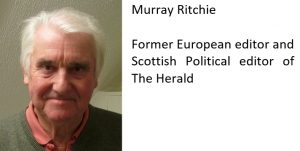Very soon the UK could have the least trustworthy prime minister for generations. Murray Ritchie poses the question: how did it come to this?
If – or when – Boris Johnson becomes UK prime minister he might look back on his years spent in Brussels shamelessly misrepresenting the work of the European Union. Given his awkward relationship with truth and facts he will probably feel no prick of conscience.
Few people have made such a notable contribution to the phenomenon of Euromythology – those lies and exaggerations peddled over the years about the alleged malevolence of the EU.
To people like Boris Johnson the European Union is little more than a gang of elitist, bossy, “unelected” Eurocrats (to Eurosceptic eyes they are always “unelected” even when, like MEPs and ministers from member states, they plainly are elected).
Euromyths must have greatly assisted the cause of Brexit. In his time as the Daily Telegraph’s Brussels correspondent, Johnson rejoiced in his reputation as the Euromyth spreader in chief.
His readers and editors lapped it all up because Johnson was always entertaining, a sometimes-brilliant writer and humourist, and utterly without the slightest twinge of embarrassment when he parted company with truth and accuracy.
His colleagues – of which I was one – in the Brussels press corps suffered because of Johnson’s artifice. My then editor called one morning angrily complaining that I had missed a great story about the European Commission’s plan to build a grandiose one-kilometre high headquarters.
It was a sensational story involving what would be the most remarkable building on earth and the tallest in the world, Johnson reported. To authenticate this load of nonsense he even offered an artist’s impression of the said pile.
His tale had one basic flaw: it was complete invention. Not a word was true.
There were so many such Euromyths around at the time that the UK Foreign Office felt moved to produce a booklet listing them in order to demolish them.
Today’s refurbished Berlaymont HQ of the Commission in Brussels stands testimony to this Johnsonian flight of imagination. But the reaction of the Telegraph’s Europhobic readers was predictable: blind fury.
Johnson’s willingness to stoke the fires of Euroscepticism was becoming legendary.
There were so many such Euromyths around at the time that the UK Foreign Office felt moved to produce a booklet listing them in order to demolish them.
It was a long list, and almost completely ignored by the overwhelmingly Eurosceptic UK press. One cracker was that Italians should be able to buy condoms that were larger than those to be made available elsewhere in the EU.
Another was that British fishermen must wear hairnets at sea. Readers of Britain’s right-wing newspapers were informed that UK motorists would soon be compelled to drive on the right. Bananas had to be straight (or bent at a certain angle, the story changed from time to time).
Of course, not all of these “news” items were the work of Boris Johnson. The Sun was also particularly active on the Euromyth trail and the Daily Express and Daily Mail tried tirelessly to keep up.
In some rare cases there might even have been a scintilla of evidence to support this type of coverage.
In the EU institutions there was a practice known as comitology. This involved the EU inviting opinions from those who might have a legitimate interest in some aspect of policy planning.
The danger with this well-intentioned process was that it sometimes led to an eager PR consultant or lobbyist offering a crackpot idea on behalf of a client.
The idea would not survive its first airing, of course, but it might be minuted before being binned at the first opportunity. Too late, it was suddenly another EU conspiracy in the eyes of the UK’s Eurosceptic press.
British tabloids and the Telegraph found comitology a happy hunting ground for mischief, confident in the knowledge that nothing would come of any of it. But over time it helped spread what Tony Blair called the “Eurosceptic virus” which now appears beyond control.
In those days Boris Johnson paraded himself as a personable eccentric. He wore designer scruff for a jacket with holes in the elbows and his hair was carefully kept unkempt.
One of his routines was to take the mickey out of EU commissioners put up to answer questions from the media at the daily briefing. The commission had a silly rule that only French could be spoken in those days – an invitation to Johnson to perform in absurdly posh Franglais to the delight particularly of the French press corps.
Jacques Delors hated it when Johnson put on one of his shows, which is why Johnson loved doing it. And he could be undeniably hilarious.
In those days Boris Johnson paraded himself as a personable eccentric. He wore designer scruff for a jacket with holes in the elbows and his hair was carefully kept unkempt.
His colleagues in the British press corps poked fun at his famous determination – which was deadly serious – to be prime minister one day. Whenever the prime minister – John Major in those days – came to Brussels the UK representation in the EU was placed on full alert for Johnson’s trouble making.
It was standard practice for Major and senior ministers to answer questions from all journalists and then steer Johnson away for a personal briefing afterwards in the faint hope that his wilder writings could be contained.
It seldom worked. What was truly astonishing was how Johnson – still a youngster learning his trade as a journalist – could instill real fear in powerful politicians and civil servants.
Even more surprising was the clear cowardice of senior Conservative ministers in facing down their own party’s Eurosceptic critics. They have long since paid a fearful price.
Brandishing a kipper Johnson slammed the rules as “pointless, expensive, environmentally damaging” and derived from a petty-minded “health and safety” culture. The EU has clarified that the requirements did not in any way derive from European law. https://t.co/8ubmIUjnYw
— Chief-Exec.com (@Chief_Exec_com) July 19, 2019
And now, barring some last-minute shock, Johnson is about to become prime minister. His years of hostility to the EU and his reputation for being a stranger to truth have caught up with him.
But no harm done, it seems. He now has the Tory Party’s strengthened anti-European feeling behind him – the sentiment he did so much deceitfully to foster.
When he enters No 10 as prime minister of the United Kingdom we might do well to bear in mind that for all his studied eccentricity, quick wit and eloquence, we still cannot believe a word he says.

Featured Image Credit: Alexandros Michailidis/Shutterstock.com




